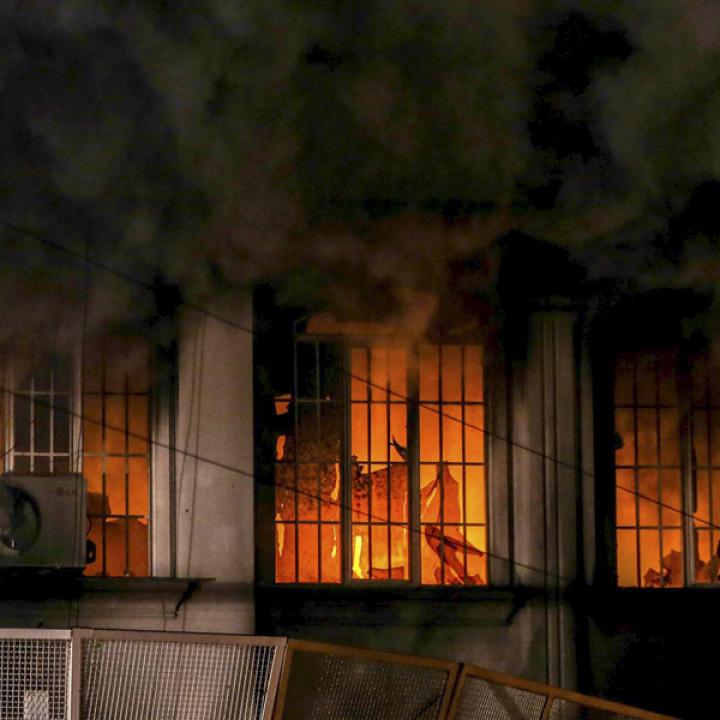
- Policy Analysis
- Policy Alert
Saudi-Iranian Diplomatic Crisis Threatens U.S. Policy

Washington must act promptly to prevent the execution of a Saudi Shiite leader and the Riyadh-Tehran diplomatic break from imperiling the fight against the Islamic State and the Iran nuclear accord.
News of the January 2 execution of forty-seven men accused of terrorist offenses in Saudi Arabia was applauded within Saudi Arabia and by the kingdom's Arab allies but shocked much of the rest of the world. Only four of the forty-seven men executed were Saudi Shiites, but the fate of Sheikh Nimr al-Nimr (literally: Tiger, the Tiger) has dominated subsequent events. A firebrand political leader from Saudi Arabia's oil-rich Eastern Province, where the kingdom's minority Shiite population forms a local majority, he had been accused of fomenting violence. While his actual involvement in terrorism was debatable, his outspoken criticism of the Saudi royal family was not in doubt.
In rapid succession, Nimr's execution was followed the same day by demonstrations in Shiite areas of the Middle East and South Asia, including the sacking and burning of the Saudi embassy in Tehran and an attack on the Saudi consulate in Mashhad. Yesterday, Saudi Arabia announced it was breaking diplomatic relations with Iran and gave Iranian diplomats forty-eight hours to leave. A rocket was also reportedly fired against the newly established Saudi embassy in Baghdad. Today, Bahrain, which hosts the U.S. Fifth Fleet's headquarters and has long complained of Iranian support for a simmering Shiite insurrection, declared it was also breaking formal ties with Iran. Sudan and the United Arab Emirates quickly followed, although the UAE's action was limited to downgrading diplomatic ties.
Apart from the danger that this flare-up between regional rivals, Saudi Arabia and Iran, could lead to outright hostilities, a parallel prospect exists that U.S. action against the Islamic State could be undermined and that last summer's accord to dismantle much of Iran's nuclear program could unravel. The nuclear deal was already under strain because of continued Iranian ballistic missile testing, which was supported by the likes of President Hassan Rouhani, supposedly the deal's greatest champion. In recent days, Washington's regional allies have watched with concern as additional sanctions against Iran were prepared but then abruptly delayed, reviving memories of the Obama administration's perceived irresolution against Syrian president Bashar al-Assad's use of chemical weapons in 2013 (for more on this growing Gulf concern, see "Riyadh's Message Is to Washington as Well as Tehran").
As today's action by Bahrain suggests, Washington needs to move quickly to prevent a full-scale diplomatic confrontation with military dimensions. It may be too late. Nine days ago, the U.S. profile in the region was further undermined when Iranian naval units conducted a sudden live-fire exercise in the strategic Strait of Hormuz while the carrier Harry S. Truman was entering the Gulf. Along with U.S. hesitancy on Iranian missile sanctions, the incident gave the appearance to Washington's Gulf allies of indecision and unwillingness to confront Iran, as well as ineffectiveness.
Separately, Iran's own provocations are unlikely to mitigate international concern over the ruthless Saudi tactics. The January 2 executions, in twelve different locations, were reportedly carried out by firing squad or beheading. An official Saudi statement quoted the Quran to the effect that those executed had waged war against Allah and his messenger, the Prophet Muhammad, and had done mischief in the land. The statement continued by claiming that the appropriate punishment was death or crucifixion -- in Saudi terms, meaning the corpse should be publicly displayed -- or the cutting off of a hand from one side of the body and a foot from the other. It is not clear what, if anything, happened on this occasion beyond simple execution.
Whatever the gruesome details, the executions undermined Saudi Arabia's attempts internationally to distinguish its methods of punishment from those of the Islamic State. While the kingdom is paying tens of millions of dollars to Western investment banks and management consultancies for advice on how to restructure its economy, it appears at best tone-deaf to negative impressions of some of the ways Islam is practiced in the kingdom.
Last month, Saudi Arabia announced its own coalition of Muslim-majority countries to fight the Islamic State (IS). Though surprising, the move fits U.S. thinking that a Sunni Muslim force is the best way of confronting and ultimately destroying IS. With U.S. logistical and intelligence support, Saudi Arabia is also leading an Arab coalition in Yemen against Houthi rebels supported by Iran, and has been backing anti-Assad fighters in Syria. Yet despite its long history, the U.S.-Saudi bilateral relationship is under considerable strain and perhaps reconsideration, at least in Riyadh. Saudi reports in late November had suggested this past weekend's mass execution was likely. U.S. diplomats had since apparently warned their Saudi counterparts of the possible regional consequences of including Nimr, but their protestations were ignored.
Washington must act swiftly to defuse the tension in the Gulf. Deterring Iranian troublemaking more openly and vigorously should reassure Saudi Arabia of Washington's support -- even if this support is sometimes mixed with criticism -- against the Islamic State and the challenge represented by Iran.
Simon Henderson is the Baker Fellow and director of the Gulf and Energy Policy Program at The Washington Institute.



